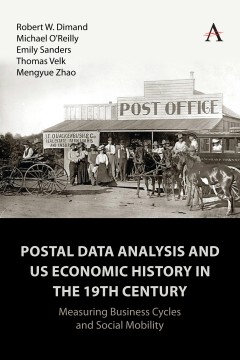Postal Data Analysis and US Economic History in the 19th Century
Measuring Business Cycles and Social Mobility
By Robert Dimand
Michael O'Reilly
Emily Sanders
Thomas Velk
Mengyue Zhao
Other Formats Available:
E-Book- About This Book
- Reviews
- Author Information
- Series
- Table of Contents
- Links
- Podcasts
About This Book
Previously unexploited postal data provides a good proxy for economic activity in the nineteenth-century United States, disaggregated down the area served by each post office for each two-year period. Compensation paid to every employee of the United States Government, including postmasters, was published for each two-year period from 1816 in the Official Register, of which only a few complete sets survive. Postmasters were compensated according to the volume of business at their post office, in an era where mail was the principal means of communication and postal money orders played a crucial role in the payments systems. Because the formula according to which postmasters were compensated changed repeatedly, earlier historians were unable to go from the compensation of postmasters to the revenues of their post offices. We have been able to determine what the compensation formula at each time and so can back out the volume of business in each post office in each period from the compensation paid to the postmaster. This provides us with a proxy for economic activity that is much more disaggregated in space and time than previously available estimates.
We use this measure of economic activity to study economic fluctuations by region and to investigate how regions differed in their sensitivity to national business cycles in the nineteenth-century United States. The data also make it possible to follow, at a finer level of disaggregation than was previously attainable, the effect of the expanding railway network on economic activity. We use data on postal money orders to explore the flow of funds between states as well as between states and foreign countries.
We use data on postmasters and their compensation to illuminate issues of social mobility and status, with particular attention to female and African American postmasters and to the transmission of postmaster positions within families. This book draws the attention of historians to a previously neglected treasure trove of quantitative information on the economy and society of the nineteenth-century United States.
Reviews
Author Information
Robert Dimand is a professor of economics at Brock University.
Michael O’Reilly is an independent researcher and postal historian.
Thomas Velk is Professor Emeritus of Economics at McGill University, where he was Director of the North American Studies Program.
Mengyue (Rachel) Zhao, a graduate of McGill University, holds master’s degrees in economic and social history from Oxford University and in management analytics from the University of Toronto.
Series
Anthem Impact
Table of Contents
Links
Stay Updated
Information
Latest Tweets



